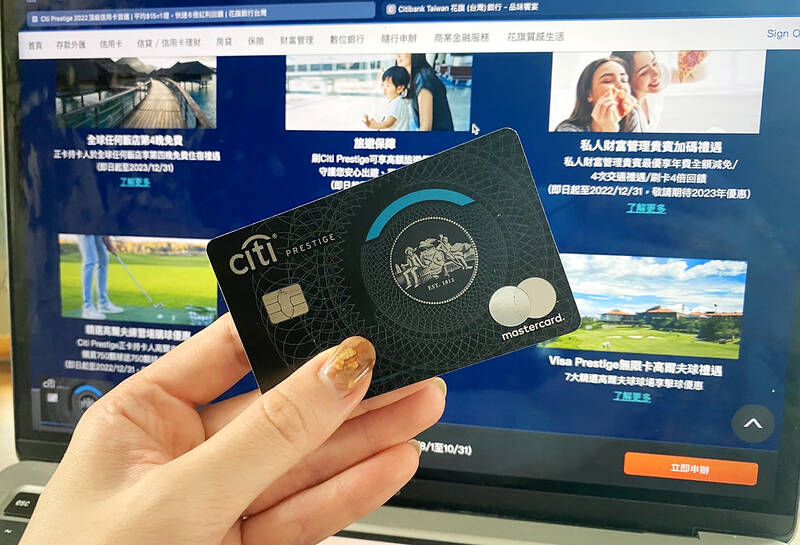Holders of Citi Prestige credit cards are entitled to deluxe options for dining, golf driving ranges, traveler insurance and a limited-quantity offer of Shin Kong Mitsukoshi Department Store (新光三越百貨) coupons worth NT$18,000 each.
As the COVID-19 pandemic eases, Citibank Taiwan Ltd (台灣花旗) has unveiled benefit packages for travelers with Citi Prestige, the bank announced in a news release on Friday last week.
Cardholders may dine with a plus one without incurring additional charge at a Citibank partner establishment, including Sheraton Grand Hotel Taipei’s (台北喜來登大飯店) Kitchen 12, Guest House, The Dragon, Pizza Pub, Antoine Room, Sukhothai and Momoyama; and My Humble House and Latest Recipe at Le Meridien Taipei (台北寒舍艾美酒店), among others.

Photo courtesy of Citibank Taiwan Ltd
Users of the card are also entitled to a gratis of 750 golf balls upon purchasing the same number at six partnered driving ranges in the country. These perks and many more are available to cardholders from the autumn through the last months of next year.
Citi Prestige offers premium rewards, fine dining, luxury hotel, seamless travel and personalized concierge to its most select clientele. Making the rewards more available to cardholders, six credits are awarded for every NT$30 spent on an international or domestic purchase, a reward equivalent to one mile of mileage per NT$15 of spending.
For international travel, Citi Prestige cardholders may enjoy eight rides to and from airports free of charge a year that can be exchanged for domestic high-speed or regular rail tickets on a one-to-one basis, in addition to two hours of chauffeuring services.
Cardholders may also receive 30 days of free parking in five-day increments at international airports a year.
Further, Prestige Card members are entitled to a complimentary fourth night of stay at any hotel in the world as well as the Citi Prestige concierge service, which is available 24 hours a day.
To ensure the travel safety of Citi Prestige cardholders, the bank offers its members up to NT$50 million of travel insurance for public transportation and up to NT$10 million in full-trip travel insurance, alongside travel medical insurance coverage of up to NT$300,000.
Marking the eighth anniversary of the Citi Prestige program, the bank is rolling out the biggest bonuses this year for new accounts, starting on the day of the announcement to Oct. 31.
New clients who have accumulated 100,000 of spending in regular transactions and paid all fees within 60 days of the account’s opening are qualified for a limited offer of 800 Shin Kong Mitsukoshi coupons worth NT$18,000 each.
Meanwhile, eligible members who did not get a coupon would instead receive 15,000 in bonus credits.
Moreover, Citigold members are eligible for 30,000 credits in Citi ThankYou Rewards.
For more information, visit the official Web site for Citi Prestige Card at www.citibank.com.tw/citiprestige.
The revolving interest rates for Citibank credit cards ranges from 6.88 percent to 15 percent, while processing fees for cash advances are 3.5 percent of the sum of the cash advance plus NT$100. For information about other fees, visit Citibank at www.citibank.com.tw.

GROWING OWINGS: While Luxembourg and China swapped the top three spots, the US continued to be the largest exposure for Taiwan for the 41st consecutive quarter The US remained the largest debtor nation to Taiwan’s banking sector for the 41st consecutive quarter at the end of September, after local banks’ exposure to the US market rose more than 2 percent from three months earlier, the central bank said. Exposure to the US increased to US$198.896 billion, up US$4.026 billion, or 2.07 percent, from US$194.87 billion in the previous quarter, data released by the central bank showed on Friday. Of the increase, about US$1.4 billion came from banks’ investments in securitized products and interbank loans in the US, while another US$2.6 billion stemmed from trust assets, including mutual funds,

Micron Memory Taiwan Co (台灣美光), a subsidiary of US memorychip maker Micron Technology Inc, has been granted a NT$4.7 billion (US$149.5 million) subsidy under the Ministry of Economic Affairs A+ Corporate Innovation and R&D Enhancement program, the ministry said yesterday. The US memorychip maker’s program aims to back the development of high-performance and high-bandwidth memory chips with a total budget of NT$11.75 billion, the ministry said. Aside from the government funding, Micron is to inject the remaining investment of NT$7.06 billion as the company applied to participate the government’s Global Innovation Partnership Program to deepen technology cooperation, a ministry official told the

Taiwan Semiconductor Manufacturing Co (TSMC, 台積電), the world’s leading advanced chipmaker, officially began volume production of its 2-nanometer chips in the fourth quarter of this year, according to a recent update on the company’s Web site. The low-key announcement confirms that TSMC, the go-to chipmaker for artificial intelligence (AI) hardware providers Nvidia Corp and iPhone maker Apple Inc, met its original roadmap for the next-generation technology. Production is currently centered at Fab 22 in Kaohsiung, utilizing the company’s first-generation nanosheet transistor technology. The new architecture achieves “full-node strides in performance and power consumption,” TSMC said. The company described the 2nm process as

Even as the US is embarked on a bitter rivalry with China over the deployment of artificial intelligence (AI), Chinese technology is quietly making inroads into the US market. Despite considerable geopolitical tensions, Chinese open-source AI models are winning over a growing number of programmers and companies in the US. These are different from the closed generative AI models that have become household names — ChatGPT-maker OpenAI or Google’s Gemini — whose inner workings are fiercely protected. In contrast, “open” models offered by many Chinese rivals, from Alibaba (阿里巴巴) to DeepSeek (深度求索), allow programmers to customize parts of the software to suit their